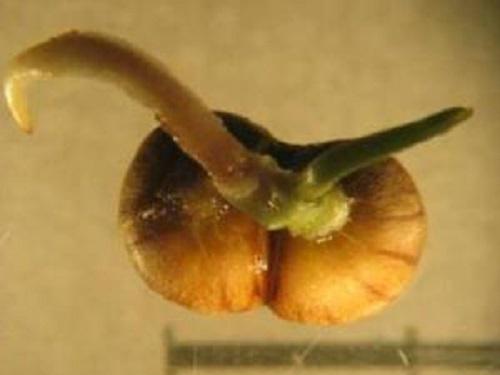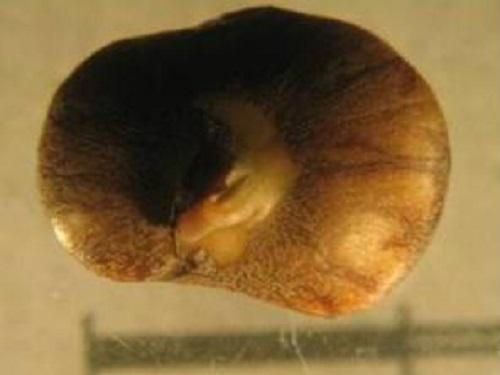Nicolas Niemenak
Our project aims to analyse factors susceptible to increase the germination potential/capacity of P. africana seeds and to develop propagation via somatic embryogenesis.

Seeds 21 days after germination.
Prunus africana (Rosaceae) is a tree restricted to Afromontane forest islands in mainland Africa from Ethiopia to South Africa, and from the west coast to the outlying island of Madagascar (White, 1983). P. africana is an important multipurpose tree species (Cunningham et al., 1998); its bark is the only source of an important drug, which is used in the treatment of benign prostatic hyperplasia (Marandola et al., 1997). The increasing market for P. africana intensifies destructive bark harvesting and endangers the long-term sustainability of the conservation of P. africana and associated species.

Seeds 7 days after germination.
In Cameroon, mounts Cameroon, Kupe, Oku, Tchabal Mbabo and the West highlands supports the main population of P. africana. In recent years, overexploitation, bush fire and poor quality of regeneration of the species have given rise to dramatic reduction of it natural population. Nowadays, in Cameroon, commercial exploitation of this specie is forbidden. If adequate management measures are taken for the in-situ and ex-situ populations, there is no reason why the species should not continue to be exploited and traded. In Cameroon, farmers have started cropping P. africana. Therefore, it is necessary to encourage them by providing viable seedlings in order to sustain the management of the species. Seed germination is poor after storage. Stem cuttings have been tested in rooting experiments. Although this technology provides saplings, the success rate of growth and the quality of material generated are limited.
Because of the poor availability and quality of seedlings, germination needs to be improved. Germination is affected by interactions between genetic determinants and environmental factors. Plant hormones can impact seed dormancy and germination. A molecule, such as nitric oxide (NO) can significantly impact germination. The first goal of this project is to evaluate the effect of NO donor, sodium nitroprusside (SNP), acidified nitrite and gibberellic acid on the germination of P. Africana after storage. In mountain, perception and transduction of signals derived from UV light is high. The effect of different exposure time of Prunus seeds to UV light on germination will be monitored.
Recent advances in biotechnology improve crop yields and techniques of vegetative propagation. Under auxin or stress-related treatments, a somatic plant cell can dedifferentiate to give rise to a totipotent embryogenic cell that has the ability to proliferate and regenerate an embryo. The second goal of this project is to induce Prunus regeneration using somatic embryogenesis process.